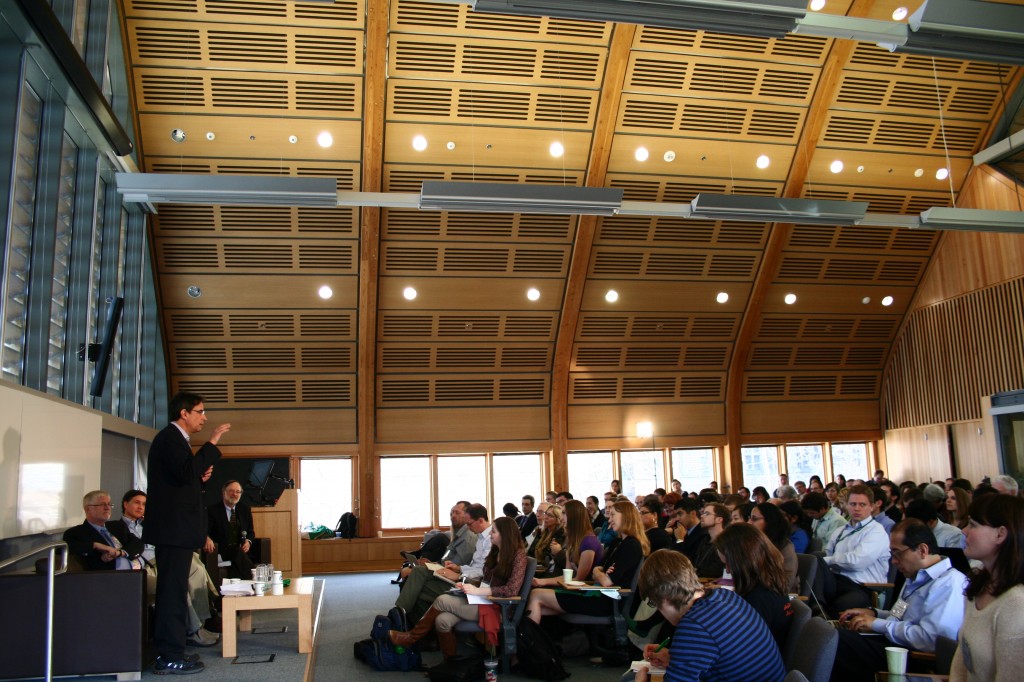What a day of thought provoking discussion! The summit kicked off with a panel entitled “Twenty Years After Rio, Why are We Not There Yet?”

According to Daniel Esty, Commissioner of the Connecticut Department of Energy and Environment, we have mishandled the need for firm analytic metrics of success, we haven’t properly acknowledged uncertainties, and our solutions haven’t been sufficiently economically sensible to be adopted. The environmental movement, swelling out of the civil rights movement, has leaned on righteousness as a motivator for action. Unfortunately, righteousness isn’t enough to carry the day; we must re-frame and refocus our policy approaches, underwritten with a proper analytic foundation. When discussion of the broken deal comes up, it’s important to note that the US never agreed in the first place to reduce pollution, greenhouse gas emissions, and consumption. When everything is a priority, nothing is a priority, yet Agenda 21 had 115 chapters of commitment. Moving forward, the indicators to measure success should be the indicators themselves. We should develop a set of sustainability performance measurements and agree to methodologies. The presence of an indicator dashboard will spur investment. Principles matter, but process is equally important. The end goal is not to have a higher authority invest in sustainable development, but to shape how all capital flows sustainably, which requires a deftness and subtlety on the part of the government.
Jacob Scherr of NRDC also identified several reasons we haven’t made more progress in the last twenty reasons. The industrialized world made a deal with developing countries to reduce consumption, reduce pollution, and provide massive assistance in exchange for sustainable development and natural resource use in the developing world. This hasn’t happened in large part, eroding trust and creating a more challenging negotiating climate. The US in particular has shied away from taking a leadership position. Also, Rio 1992 used the 1950’s approach of top-down, one-size-fits-all management. The notion that political leaders would sign an agreement then return home and implement their promises was a simplistic expectation – the world is much more complicated. In the last twenty years, the world population has grown by 1.2 billion, with many more people living in urban centers. Energy use has sky-rocketed. We are clearly bumping up against the capacity of the planet to meet our needs and absorb our pollution. The public is not sufficiently aware and engaged in the environmental movement to create the political will for action. Citing Thomas Friedman’s thoughts on globalization and connectivity, Scherr talked about the importance of Rio+2 as a way to engage the private sector, local governments, academia, private philanthropies, and other stakeholders. With 6 billion cell phone users and 2 billion people connected to the Internet, it’s time we create a summit that recaptures the attention of the public and provides a platform for thousands of leaders to make a cloud of specific commitments on issues we’ve been just talking about for too long.
Langston James “Kimo” Goree VI, Director of the International Institute for Sustainable Development, rounded out the conversation. Twenty years after Rio, the United Nations is in retrograde in regards to the environment and sustainable development. The grand deal of 1992 was never fulfilled and developing countries haven’t forgotten this, which creates a hardline negotiating atmosphere. There was a spirit to Rio, a willingness of governments to forego their national interests for the sake of the common good, but that spirit can’t be found in the UN negotiating rooms of New York these days. Additionally, with the establishment of the World Trade Organization, the globalization paradigm has ascended to a dominant position. In 1992, we thought the money invested in the arms race would be available for aid, but wars rage on and the mantra is “trade not aid.” With Einstein in mind, let us not do the same thing over and over again and expect different results. We aren’t there yet because we continue tired, non-binding negotiations of woulds, should, and oughts. We should engage technology and information firms and invite them to present best practices in how innovative technology can be brought to bear on sustainable problems. In order for the smartest people to be in the room at Rio+20, it must be a virtual room.
I’m looking forward to the second day of the US/Canada Citizens’ Summit. With these insights in mind, let us continue to grow and frame the conversation today. We don’t have time to make the same mistakes again – that would be insanity.
Angel Hertslet
MESc candidate, 2013